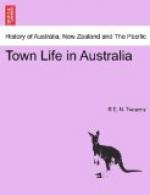The modern Australian stage, however, only dates back as far as 1853. How popular it had become may be judged from the fact that Melbourne has four theatres, Sydney two, and Adelaide two, besides concert halls. As in England, these theatres have nothing to recommend them outside, nor can the interior arrangements be commended. A large part of their beer revenue is derived from drinking bars which are kept in connection with them. One of these, though respectable enough, is generally unpleasantly in close proximity to the entrance to the best seats in the house, and the other forming a rendezvous for all the bad characters in the town. The auditoria are nearly all badly ventilated, and ill fitted up, the only exceptions being the Theatre Royal at Adelaide, and the Bijou in Melbourne. The approaches and exits, are for the most part poor. Boxes are unknown, and the stalls are only second-rate seats. The dress-circle, which is considered the best part of the house, consists of a kind of open gallery fitted up like the stalls of a London theatre. Above are the ‘gods,’ and below the pit. Prices of admission are very moderate; I have been told that during Ristori’s and De Murska’s visits, as much as ten shillings was charged for a dress-circle seat, but six shillings is the highest charge that has been made since 1876. In any theatre six shillings is the usual amount for the better performances, the worst only asking four, and at some theatres coming down as low as 3 shillings. Except when an Italian Opera Company is playing, full dress is unnecessary, and even unusual, at the theatre.
The colonial taste in theatrical matters follows the English pretty closely. Opera-bouffe and Gilbert and Sullivan are preferred to everything else. Next in popularity is the ‘New Babylon’ type of play. Low comedy also draws well; and I have often wondered that Mr. Toole has not paid us a visit. Opera pure and simple used to be more appreciated than it is; but as the companies which produced it were always very second-rate, its temporary disappearance is not altogether to be regretted. The class of opera company that usually comes out here may be imagined when I tell you that Rose Hersee was a favourite prima donna! There are now sufficient resident operatic singers of the third class to perform opera without assistance from European stars; but by themselves these purely colonial companies do not draw well, except in pieces of the ‘Patience,’ or ‘Tambour-Major’ type. The Byron comedies are popular throughout Australia. Thanks to a company which came out from Enaland in 1880, and most of the members of which have taken up their abode here, they have been much better acted than any other class of plays. The modern society drama is not much appreciated, partly because the life in which its action takes place is little understood, and partly on account of the lack of the class of actors required to make the pieces successful. Dion Boucicault is still a favourite. Shakespeare is frequently played but, although the stage-mounting has been exceptionally good, and we have had such very fair actors as Creswick, and Hoskins, and Scott-Siddons, a high, authority has recently declared that Rignold’s ‘Henry V.’ is the only Shakespearean performance, that has paid for many years.




